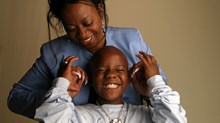Curb Motion Sickness
You've driven about 50 miles when you hear your toddler from the back seat say, "Mommy, I feel sick." You remember your car trips when he was a baby and there wasn't a problem then. What happened to make this healthy kid develop an allergy to the car? The average toddler spends most of his waking hours in motion, so it's ironic that the toddler years often mark the onset of motion sickness. But according to Pennsylvania State University psychologist Robert M. Stern, motion sickness can set in when a child learns to walk.
If you think about it, the walking/ motion sickness connection makes sense. Stern notes that the same mechanism that allows balance in walking?the inner ear?is also the one affected by motion sickness. The semicircular, fluid-filled canals in the inner ear help maintain two types of equilibrium: static, which is the orientation of the head and body to the ground, and dynamic, which is the orientation of the head and body to movement.
While traveling in a car, a small child usually can't see outside, so her eyes and static equilibrium tell her brain that she isn't moving. But her dynamic equilibrium senses the motion of the car and sends the opposite message. The brain responds by sending a message that something isn't right, resulting in the sensations we call motion sickness.
So what can you do to help? Dr. Stern offers these suggestions:
Get the child to eat before you travel. A child with an empty stomach is more likely to throw up. A small, low fat, non-greasy meal or a protein snack such as cheese and crackers is good.
Raise the child's seat so he can see out the window. From his position in the back seat, all your child can see is the interior of the car. Putting your child at window level stops the mixed signals and ultimately reduces the motion sickness. For younger children, some car seats have a lever that changes the level. For older children, a booster seat will often put their eyes at window level.
Stop often and at the first signs of sickness. If your child gets sick, stop immediately and let him lie down until the sickness and dizziness subside.
Avoid strong-smelling foods or smoking in the car. Odors can add to queasiness, so keep the window cracked for fresh air.
Know the warning signs. If your child is unable to verbally communicate that he feels sick, look for perspiring, loss of color, restlessness, or continued yawning.
Quick Fixes
Dramamine, an over-the-counter medicine specifically for motion sickness, works for many children, but be sure to check with your pediatrician first. One alternative to medication is a product called Biobands?bracelets that put accupressure on a point on the wrist said to be helpful for relieving motion sickness. They cost $12.85 and are available by calling (800) 962-4943
Copyright © 2001 by the author or Christianity Today/Christian Parenting Today Magazine.
Click here for reprint information on Christian Parenting Today.
Read more articles that highlight writing by Christian women at ChristianityToday.com/Women
 Read These Next
Read These Next
 Story powerTeach your child emotional intelligence through great books
Story powerTeach your child emotional intelligence through great books
 Not Your Average "Road Trip"The Art of Simple’s Tsh Oxenreider and her daughter, Tatum, on their worldwide family adventure
Not Your Average "Road Trip"The Art of Simple’s Tsh Oxenreider and her daughter, Tatum, on their worldwide family adventure
 Raising Strong Christian Boys5 ways I’m building up my sons’ character
Raising Strong Christian Boys5 ways I’m building up my sons’ character








 Homepage
Homepage